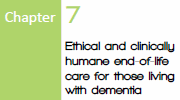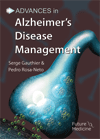 CHAPTER 7: Ethical and clinically humane end-of-life care for those living with dementia
CHAPTER 7: Ethical and clinically humane end-of-life care for those living with dementia
by Michael Gordon
Editors:
Serge Gauthier, McGill University, Montreal, Quebec, Canada
Pedro Rosa-Neto, McGill University, Montreal, Quebec, Canada
Publisher: Future Medicine
Reviewed by: Michael Gordon, MD, MSc, FRCPC, FACP, FRCPEdin
 It is always a pleasure to be able to discuss a new book to a receptive audience when I believe the book has something special to offer. When it comes to reviewing books outside the realm of medicine or the medical sciences, reviews often are reflective of the personal and aesthetic views of the reviewer. There are many books written for professional readers on the fringe of medical science that deal with non-clinical aspects of medicine and many that have translated important medical concepts to the lay audience and others in the form of memoirs and novels of the personal and historical type that add a great deal to the general wealth and richness of medicine and the associated medical sciences.
It is always a pleasure to be able to discuss a new book to a receptive audience when I believe the book has something special to offer. When it comes to reviewing books outside the realm of medicine or the medical sciences, reviews often are reflective of the personal and aesthetic views of the reviewer. There are many books written for professional readers on the fringe of medical science that deal with non-clinical aspects of medicine and many that have translated important medical concepts to the lay audience and others in the form of memoirs and novels of the personal and historical type that add a great deal to the general wealth and richness of medicine and the associated medical sciences.
To undertake an academic text book is always a daunting task. Generally if experts and specialists in the field cannot write such a book without the help of others and currently the idea of editors securing experts to write the relevant chapters is a well-accepted methodology for achieving that goal. That being said it becomes the responsibility of the editors to make sure that those that they recruit to write the relevant chapters have the academically sound and clinically and research-based capability of doing so and on top of that have the writing skills to achieve their goal. Moreover, for the chapters to hang together in one strives to have some degree of congruence in the writing approaches and styles, while at the same time promoting the particular capabilities of the writers of each chapter. At the end it is hoped that the chapters hang together into a whole that attracts the reader and provides a perspective on the subject and each of its varied components that would be hard to achieve if the reader decided to explore each of the subject chapters separately without the benefit of them being collated, edited and reference into one easily accessible book.
I am therefore pleased and honoured to not only present the book to subscribers of HealthPlexus.net, Advances in Alzheimer’s Disease Management edited by Serge Gauthier and Pedro Rosa-Neto but to have been one of the contributors. At a time when the knowledge surrounding Alzheimer’s disease and other dementias is on the one hand expanding rapidly from the scientific perspective, for the practicing physician and patient living with dementia and their families, the challenges seems to be overwhelming. There seems to be a huge disconnect between the understanding and scientific progress of the causes in many domains of enquiry and the actual clinical impact that all this new knowledge currently has that physicians in the front lines of care can utilize clinically.
In medicine however, one never knows what key will be the one that opens the door we are all looking to enter. At any given time all we can do is to try and figure out using the best clues and evidence available to know what secrets lay behind that door. The readily accessible E-book format in which Advances in Alzheimer’s disease management is produced allows for a relatively low cost alternative to the usual costs of hard copy texts. The content of the book covers all the main challenging concepts and recommended or best-practices as they exists currently. Obviously in time, perhaps a very short time, some of these will change but for those in the field we all know that many of the concepts and practices have not changed in many years.
The table of contents includes the following subjects by the authors listed next to the chapter titles, with mine at the end. I have been given permission to reproduce my chapter, Ethical and clinically humane end-of-life care for those living with dementia on the HealthPlexus.net website so that subscribers can get a taste of the e-book itself.
1) Genetics of Alzheimer’s disease by Jayashree Viswanathan, Hilkka Soininen & Mikko Hiltunen;
2) Diagnosis of Alzheimer’s disease by Pedro Rosa-Neto, Jared Rowley, Antoine Leuzy, Sara Mohades, Monica Shin, Marina T Dauar and Serge Gauthier
3) Available symptomatic antidementia drugs by Marie-Pierre Thibodeau and Fadi Massoud
4) New drugs under development for Alzheimer’s disease by Lezanne Ooi, Kirubakaran Shanmugam, Mili Patel, Rachel Debono and Gerald Münch
5) Management of agitation and aggression: controversies and possible solutions by Clive Ballard and Anne Corbett
6) Guidelines for the diagnosis and treatment of Alzheimer’s disease by Serge Gauthier and Christopher JS Patterson
7) Ethical and clinically humane end-of-life care for those living with dementia by Michael Gordon
For those interested in ordering the book, this can be done through the following links:
The direct URL for the book is:
http://www.futuremedicine.com/doi/book/10.2217/9781780840840
For those who are interested in finding more information about the book/our e-book series, the email address is:
info@futuremedicine.com
For those who wish to place an order, the email is:
sales@futuremedicine.com

